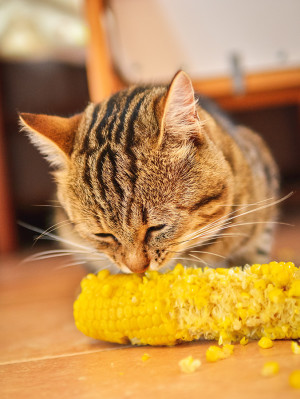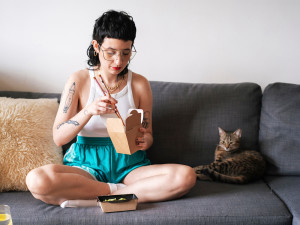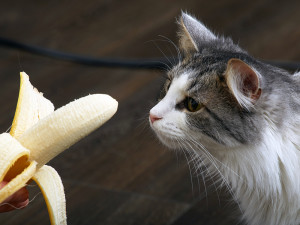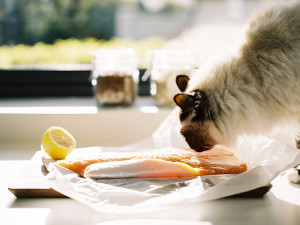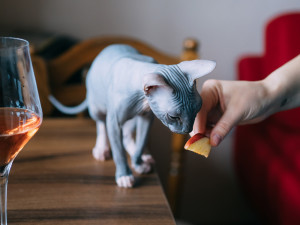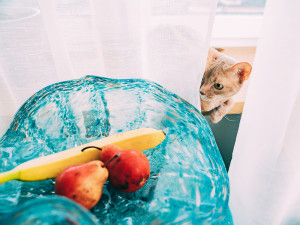
Share Article
If you live in the part of the country where summer rolls into fall, you know that as soon as those first leaves start changing color, PSS is upon us. For those not in the know, PSS of course is Pumpkin Spice Season and it is marked by the explosion of pumpkin everything; from drinks to candles to color-coordinated fall outfits.
If you love Pumpkin Spice Season, you may be wondering if your cat also loves PSS and whether they can indulge in all things pumpkin. The short answer is yes, pumpkin is safe for cats and may provide some health benefits when fed in small amounts as part of a complete and balanced diet. Just be sure it is plain pumpkin and hold the pumpkin spices. Here are all the spicy details about pumpkins for cats.
Nutrition facts for pumpkin for cats
Pumpkins are members of the gourd family, along with other kinds of squash, zucchini, and watermelon. They grow on a vine and come in many different varieties. All pumpkins are edible; however, some varieties are grown more for their aesthetics and are intended to be used mostly for decoration, while others are grown more with the intent to be eaten with an emphasis on flavor.
The main part of the pumpkin that is usually eaten is the flesh. Typically, the skin is removed and the seeds and fibrous goo are scooped out. The flesh of the pumpkin is often baked, steamed, or puréed. The seeds can also be baked and eaten separately, though these should not be served to cats. Pumpkins have many nutritional benefitsopens in new tab, including healthy amounts of fiber, beta-carotene, magnesium, and potassium.

Is pumpkin good for cats?
Pumpkin is good for cats in moderation and can provide many health benefits when added to a complete and balanced cat food diet. In fact, canned pumpkin is often recommended as a way to increase fiber for cats who have mild constipation or other gastrointestinal problems. This is because it does not have a very strong taste or smell, so many cats will tolerate it mixed into their food. Some of the main benefits to pumpkin include:
Fiber: Pumpkin contains a mix of both soluble and insoluble fiber. These carbohydrates provide important food for the good microbes within the gut as well as bulk for the stool, helping to prevent constipation.
When offered in the form of canned pumpkin, it also provides added moisture to the diet, which can help prevent constipation and promote hydration as well. While pumpkin can help to prevent mild constipation, it is not a substitute for special high-fiber diets. Cats with more chronic, complicated health problems may require a diet change and/or specific medications to control their signs.Beta-carotene: Pumpkins contain generous amounts of this antioxidant, which protects cells against damage from free radicals. Antioxidants are believed to play a role in protecting against certain diseases like cancer and heart disease. In humans, beta-carotene is also converted into Vitamin A, which has many important roles in the body; however, it is believed that cats cannot convert beta-caroteneopens in new tab to vitamin A. Cats must get their Vitamin A in its pure form directly from their diet, which is why it is so important that they eat a commercial cat food diet.
Minerals: Pumpkins also contain healthy amounts of magnesium and potassium, two minerals that are essential to normal biological functions. Magnesium plays many roles in the body, including in reactions needed for healthy bones, muscles, heart, and nerve function. Potassium is critical to all tissues in the body and plays a vital role in normal fluid balance, muscle contractions, and blood pressure.
Can cats eat pumpkin spice-flavored foods?
No, items seasoned with pumpkin spice flavors are actually not safe for cats, so it is very important to be sure you are offering your cat plain pumpkin. Pumpkin spice mixtures often contain spices such as cinnamon and nutmeg, which are both toxic to catsopens in new tab. Other ingredients may also be present in these flavorings, including large amounts of sugar and/or other ingredients which may be unsafe for cats.
Are pumpkins completely safe for cats?
Plain pumpkin is safe for cats in small amounts. It can be used as a treat or as a supplement to their diet and provides some valuable health benefits. It is important to keep in mind a few important points when offering pumpkin to your kitty:
Start small: While pumpkin can provide health benefits to your cat, it also contains a lot of fiber. Be sure to start with just a small taste to be sure your cat can tolerate it and that it doesn’t cause diarrhea, bloating, or excessive gas. In general, a spoonful or two is plenty for any cat even if they do tolerate it well. Filling up on too many high-fiber foods can make your cat too full to eat their regular diet, which they need to get all of their daily nutrients.
Avoid seeds: While toasted pumpkin seeds are a satisfying snack for us, avoid sharing them with your kitty. Their size and shape can make them choking hazards, or could even cause an intestinal blockage if swallowed whole.
Beware of other ingredients: Be sure to offer your cat plain pumpkin only. Products seasoned with pumpkin spices, or canned pumpkin pie filling, may contain spices like nutmeg and cinnamon that are toxic to cats. Also beware of dishes cooked with pumpkin that may contain additional toxins, like garlic or onions.
The bottom line: Can cats eat human food?
The good news is that plain pumpkin is a food you can share with your cat, and many cats seem to enjoy it. In general, it is always important to ensure that your cat gets the bulk of their diet from a complete and balanced cat food diet. Cats have very unique nutritional needs and commercial cat foods are specially formulated and analyzed to ensure they meet these needs.
Human foods and treats often lack major nutrients that cats need, so be sure to limit all of these snacks to less than 10 percent of your cat’s total diet. It is also very important to double check that any human foods you are thinking of sharing with your kitty are actually safe for cats, It can be a surprise to learn which foods are safe and which ones may be toxic. If in doubt, be sure to contact a pet poison hotline and/or your veterinarian before offering something new to your kitty.
Other human foods that are safe for dogs:
Fruits like apples, bananas, and blueberries are safe to share with your kitty
Corn can be a safe snack in small amounts
Broccoli and carrots can also be a good snack in moderation
Other foods that are dangerous for dogs:
Milk actually causes digestive upset in cats since they are lactose-intolerant.
Garlic can cause life-threatening anemia in cats.
Avocado can cause digestive upset for many cats, and it contains a toxin called persin that can cause more serious health problems if large amounts are consumed.
FAQs (People also ask):
How much pumpkin can a cat eat?
Each cat is different so it is best to start with a tiny bite and see how your cat tolerates it. In most cases, one to two tablespoons is the most they should eat in a day to avoid digestive upset.
Is it OK to give pumpkin to cats?
Yes, plain pumpkin with no spices or seasoning is safe for cats to eat in small amounts.
Why do cats like pumpkin?
Cats may like pumpkin because it has a mild smell and taste. They may also be attracted to the texture, as it is satisfying to bite.
Can cats eat raw pumpkin?
Yes, pumpkins are non-toxic to cats. Uncooked pumpkin has more fiber than cooked pumpkin, so only small amounts should be offered to avoid digestive upset.
Are pumpkins safe for cats?
Yes, pumpkins are safe for cats. Avoid giving them any pumpkin with spices and/or seeds as these are not typically safe for cats.
References:
Mississippi State University Extension: Growing Pumpkins for the Home Gardenopens in new tab
US Department of Agriculture: Pumpkin, Raw, Nutritional Facts opens in new tab
Harvard School of Public Health: Winter Squash opens in new tab
ASPCA Poison control: When Pumpkin Spice Is Not So Nice opens in new tab

Dr. Amy Fox, DVM
Amy Fox, DVM is a small animal veterinarian in New York City with over thirteen years of experience in a mixture of general practice, emergency medicine, and shelter medicine. A lifelong animal lover, Dr. Fox studied biology in college and then worked as a veterinary nurse before pursuing veterinary school at Cornell University. Her expertise includes surgery, dentistry, and management of chronic conditions, and she is interested in toxicology, pain management, nutrition, care of senior pets, and educational outreach. Dr. Fox also enjoys writing about veterinary medicine and teaching, and her work has previously appeared in Spruce Pets. In her free time, she loves to cook, garden, go for long runs, and hang out with her goofy mixed-breed dog May, who provides never ending comic relief!
Related articles
![A cat staring at a peeled banana]()
Can Cats Eat Bananas?
Gwen Stefani taught us how to spell it, but can we feed this fruit to our cats?
![A kitten sniffing a ripe half of an avocado in a bowl]()
Can Cats Eat Avocados?
Just don’t get out the guacamole bowl.
![Cat eating from a plate of raspberries and blueberries]()
Can Cats Eat Blueberries?
Go ahead and serve up the superfood — with a couple caveats.
![A Birma Kat Smells Fresh Fish On A Board Ready To Be Cooked.]()
Can Cats Eat Tuna?
It’s a classic kitty snack, but don’t go overboard.
![A gray Sphynx cat sniffing an apple slice held out by her owner while standing on a table next to a glass of wine]()
Can Cats Eat Apples?
Yes, but the fruit might not hold much a-peel.
![Cat behind a curtain attempting to get fruit in blue bowl]()
What Fruits and Veggies Can Your Cat Feast On?
Pass the fruit bowl — it’s treat time.


